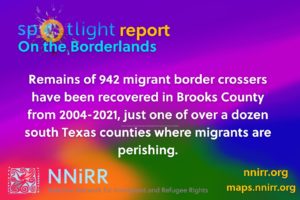NNIRR calls for immediate government action to support the families of the tragedy in San Antonio and address crisis of migrant deaths
The National Network for Immigrant and Refugee Rights extends our condolences and solidarity to the families of the migrants who perished and who were injured while traveling in a trailer truck in San Antonio, Texas. The trailer was carrying at least 58 people, including women and children. At least 16 survivors have been taken to area hospitals, and 46 bodies were identified as deceased.
For decades, NNIRR has called attention to the mounting human rights catastrophe occuring at the US-Mexico border, an outcome of the U.S.’ militarized response to people in migration. This approach has pushed thousands of migrants and asylum-seekers – with no channels to obtain visas or permits for regular migration–to their deaths as they undertake dangerous migration journeys.
“Every week, NNIRR and grassroots groups along the border assist families searching for missing migrants. Some are found at hospitals or detention centers; frequently, we have to inform families that their sons or daughters disappeared along the desert. These families do not have a visa to come to the U.S. to visit morgues or search the trails where their loved ones were last seen. The pain and trauma are unquantifiable,” said Alma Maquitico, NNIRR’s Director.
The U.S.-Mexico border is one of the deadliest in the world. Migrants are perishing from heat, drownings, car accidents, and being trafficked in packed vehicles without ventilation as they attempt to circumvent border checkpoints as well as checkpoints dozens of miles away from the borderline. Preliminary Border Patrol figures reveal that 557 migrants died in 2021. In Texas – like other migrant corridors in California and Arizona – migrants are forced to travel in isolated areas where they get lost, ill, or separated from their group. As the Border Patrol’s strategic plan predicts, the “hostile terrain” will result in death. The consequences of militarized migration management approaches have been documented and denounced for years.
 NNIRR will soon be releasing a Spotlight Report and Human Rights Mapping Project, documenting the lethal consequences of U.S. immigration policy and enforcement on the lives of migrants, asylum-seekers, and border communities.
NNIRR will soon be releasing a Spotlight Report and Human Rights Mapping Project, documenting the lethal consequences of U.S. immigration policy and enforcement on the lives of migrants, asylum-seekers, and border communities.
San Antonio is another tragic reminder that death and suffering are the central and intended consequences of the immigration deterrence model. We urge the U.S. policymakers to address this human rights crisis immediately. Similarly, we urge our partners and allies to advocate for immigration legislation that places human rights at the center of our border policies and reject efforts to further securitize and militarize the borderlands.
We urge U.S. policymakers:
- To assess all laws, policies, operations, and procedures to ensure the centrality of the human rights and dignity of all migrants.
- To address the root causes of the humanitarian crisis at the U.S.-Mexico border, and end all U.S. immigration deterrence laws, policies, and operations.
- To create long-term rights-centered channels for regular immigration.
- To respect the international right to asylum law and due process for all migrants including allowing asylum seekers to await hearings within the United States.
- To investigate the specific impacts of border security on Indigenous, Latinxs of Indigenous descent, and Black migrants.
- To create a mechanism that effectively and humanely responds to migrant’s emergency 911 calls.
- To create a humanitarian DNA database that includes family reference samples from Mexico, Central America, and other countries with an explicit prohibition on using this information for criminalization.
- To provide emergency humanitarian visas for families to travel to the U.S. to repatriate remains and for witnesses who know where remains are located to assist in searches.
For media inquiries contact:
Alma Maquitico, El Paso, Texas
915-209-1788
